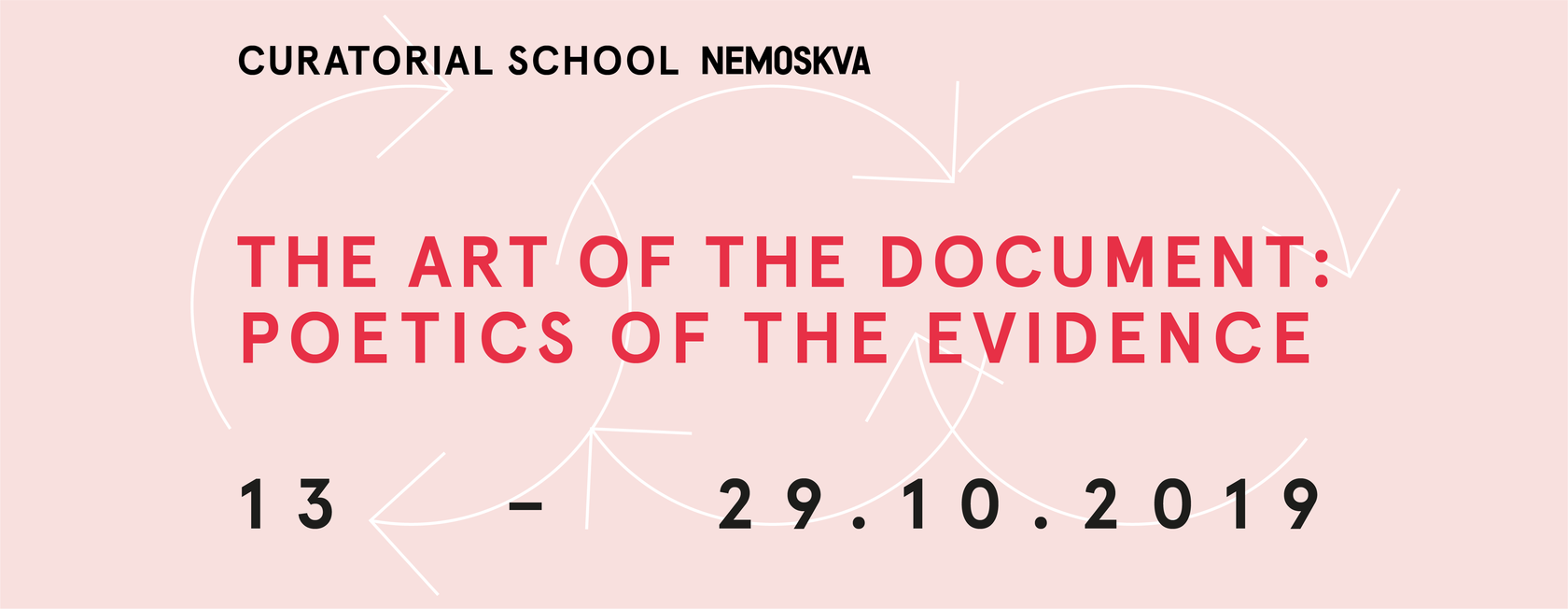

Host city: Satka, Chelyabinsk Oblast
Dates: October 13 – 29, 2019
Dates: October 13 – 29, 2019
Conditions of curatorial work in Russia's provinces differ from those in the capital. Regional experts are involved in creative activities in spite the lack of venues, absence of specialized education institutions, narrow circle of professionals, weak links inside the community and scarce communication with international experts.
The program of the Curatorial School addresses specific needs of working in the provinces and targets curators and researchers integrated in the local artistic environment and interested in its development.
The School students will have a wide range of documentary evidence to choose from, along with new forms of realism as the key tools of interaction with contemporary artistic agenda. In the current "post-truth" environment, which has gone beyond the sphere of art and matter-of-factly emerged in fake news and fact distrust, it is important to turn to the authenticity of experience and to poetics of the evidence. The possibility of becoming a document, an evidence or a fact is inherent in a piece of art. We encourage the students to consider the whole range of these issues and to search for a new ground for curatorial experiments in the documentary evidence.
In 1895, the Lumière brothers created their legendary motion picture Workers Leaving the Factory. The silent black-and-white film seemingly void of any author intonation recorded a prosaic scene of a proletarian life, thus changing the whole progress of culture. The real historic document and artefact of an artistic experiment became a conceptual landmark for many generations of artists to come. Today the idea of a piece of art as a document is reflected in avant-guard creative practices. They bring to mind such names as Maria Eichhorn, Lawrence Abu Hamdan, Hans Eijkelboom and others.
Under such circumstances, curator's thought has to research new forms of artistic production. What is the role of a picture show in public conscience? Can art produce a meaningful category of authenticity? What is the role of a document in the contemporary museum?
The two-week training schedule is crammed with activities. On an everyday basis, the students will participate in theory and practice lessons led by international and domestic lecturers, curators and researchers.
Work on one's own personal curatorial project will become the focus of the training. Upon completion of the course, the School students will have to present their concepts for a review. The best ideas will have a chance of being implemented.
In the future, the School will keep working in the nomadic mode. In the coming years we will develop new curatorial educational programs and will hold them in other cities throughout Russia.
The School students will have a wide range of documentary evidence to choose from, along with new forms of realism as the key tools of interaction with contemporary artistic agenda. In the current "post-truth" environment, which has gone beyond the sphere of art and matter-of-factly emerged in fake news and fact distrust, it is important to turn to the authenticity of experience and to poetics of the evidence. The possibility of becoming a document, an evidence or a fact is inherent in a piece of art. We encourage the students to consider the whole range of these issues and to search for a new ground for curatorial experiments in the documentary evidence.
In 1895, the Lumière brothers created their legendary motion picture Workers Leaving the Factory. The silent black-and-white film seemingly void of any author intonation recorded a prosaic scene of a proletarian life, thus changing the whole progress of culture. The real historic document and artefact of an artistic experiment became a conceptual landmark for many generations of artists to come. Today the idea of a piece of art as a document is reflected in avant-guard creative practices. They bring to mind such names as Maria Eichhorn, Lawrence Abu Hamdan, Hans Eijkelboom and others.
Under such circumstances, curator's thought has to research new forms of artistic production. What is the role of a picture show in public conscience? Can art produce a meaningful category of authenticity? What is the role of a document in the contemporary museum?
The two-week training schedule is crammed with activities. On an everyday basis, the students will participate in theory and practice lessons led by international and domestic lecturers, curators and researchers.
Work on one's own personal curatorial project will become the focus of the training. Upon completion of the course, the School students will have to present their concepts for a review. The best ideas will have a chance of being implemented.
In the future, the School will keep working in the nomadic mode. In the coming years we will develop new curatorial educational programs and will hold them in other cities throughout Russia.
Lecturers
Ilya Budraitskis
Social theorist, art critic. Editorial board Member of Moscow Art Magazine and LeftEast magazine. Lecturer at the Moscow School of Social and Economic Sciences, and ICA Moscow. Together with Arseny Zhilyaev conceived and implemented the cultural and educational Pedagogical Poem project (2012). Former researcher at the Museum of Modern History of Russia, former Head of the NCCA Media Library. Author of Dissidents among dissidents (2017), co-author of Pedagogical Poem: the Archive of the Future History Museum (2014, co-authored with A.Zhilyaev), Post-post-Soviet? Art, Society and Politics in Russia at the turn of a decade (2013, co-authored with E.Degot and M.Dzevanska) and Protecting authorities from society. Ten years of "anti-extremism" campaign in Russia (2012, co-authored with A.Epstein and A.Penzin). A regular contributor to Colta, E-flux, Krytyka Polityczna, WdWReview, Seans and other magazines.
Mikhail Durnenkov
Playwright, screenwriter, teacher. One of the participants of the New Drama theatrical movement. Winner of the 2019 Golden Mask theatre award in the drama/playwright category for the play Utopia, staged at the State Theatre of Nations. Since 2013 one of the organizers of the Festival of Young Drama Lyubimovka, known as the main Russian drama competition. Since 2011 Curator of the Russian program at the Theatre Biennale New Plays From Europe; Chairman of the jury of the drama competition Remarka. He is the author of more than twenty theatrical plays and screenplays, including Reserve; (The) easiest way to quit Smoking; Cultural layer; Trash; Blue locksmith; Easy people; A Tale of what we can and what we can not. Winner of the New Play Award (2011), Texture Award (2010) and many others.
Maria Kalinina
Director of Curatorial School NEMOSKVA, curator, lecturer, researcher of exhibition practices. Editorial Board member of Moscow Art Magazine, taught the Curatorial Strategies at the Higher School of Economics (2014-2017) and at the ICA Moscow. Curator of the START project at CCA Winzavod (2012–2013), where she implemented personal shows of Taisia Krugovykh Cinema Theater for Migrants, Igor Samolet Steam and Natasha Tarr The Oldest Theft. Co-founder, curator and lecturer of the Mediaudar activist art festival (2011-2014). Her recent curatorial projects include: Irina Korina and Svetlana Shuvaeva exhibition Articulus et Bahila, CCA Smena, Kazan (2019), Ian Ginsburg's exhibition The Mechanical Beetle, Osnova Gallery, Moscow (2017), group exhibition Breaks and convulsions, Electrozavod Gallery, Moscow (2018), and Voices Krasny (Red) Center, Moscow (2015). Lecturer and author of texts on contemporary art.
Valentinas Klimašauskas
A curator and writer. He is currently co-curating the Latvian national pavilion at the Venice Biennale (2019). Program Director of the Center for Contemporary Art kim? in Riga (2017–2018). Curator of the Center for Contemporary Art in Vilnius (2003–2013). Co-founder and editor of The Baltic Notebooks of Anthony Blunt platform (since 2008) Author of "Oh, My Darling & Other Rants" (2018) and "B and/or an Exhibition Guide In Search Of Its Exhibition" (2014). His recent curatorial projects include "Somewhere in between. Contemporary art scenes in Europe", Fine Arts Center BOZAR (Brussels), "Portals or location scouting in Kaunas" at Spike Art Quarterly (Berlin); "The Pump" at RCA (London), "Time flies like an arrow, fruit flies like a banana" at Tinos Cultural Foundation (Tinos). His works have been published in A Prior, CAC Interviu, Cura, Dot Dot Dot, Flash Art, Metropolis M, Mousse, Nero, Paletten, Ruler, Spike Art Quarterly, Šiaurės Atėnai and other magazines.
Victor Misiano
Curator, lecturer, researcher. Founder and chief editor of Moscow Art Magazine, founder of curatorial work magazine Manifesta Journal. Lecturer at the Higher School of Economics, Assistant professor at the New Arts Academy NABA, Milan, Professor Emeritus, University of Art and Design, Helsinki. Chief curator of the Russian national pavilion at the Venice Biennale (1995, 2003), chief curator of the first Central Asia pavilion (2005). Selected projects: multi-series project Human Destiny (2015-2018); exhibition Ornamentalism. Contemporary Art of Latvia presented as part of the parallel program of the 56th Venice Biennale (2015); large-scale exhibition Progressive Nostalgia. Art of the Former USSR (2007), which was exhibited in Tallinn, Prato, Athens and Helsinki; exhibitions at the Biennale in Istanbul (1992), Rotterdam (1996), Valencia (2001), Sao Paulo (2002, 2004). Author of "The Other" and different (2004), Five Lectures on the art of curating (2015).
Alla Mitrofanova
Philosopher, curator, independent researcher. One of the founders and a participant of the first Cyber-feminist Internationale (1997, Documenta X, Kassel). Head of the Philosophical cafe, co-founder of the Cyber-Feminist Club and media gallery 21 in St. Petersburg (1994). Curator of the exhibition Totalitarian body, Mexico city Museum of Contemporary Art (1991). Curator of the first Russian media festival Stubnitz-ship-art (1994). Co-author of collected volumes Mediaphilosophy of St. Petersburg State University (2018), Media Strike: Activist Art Today. II (2016), At a crossroads. Methodology, Theory and Practice of LGBT and Queer Studies (2014), ZEN d'ART. Gender History of Art in the Post-Soviet Space (2010), Unofficial Capital (2000) and other books. Author of publications in Gender Studies Magazine, Logos, NLO, Moscow Art Magazine, etc. She is an active lecturer in the alternative education network.
Dieter Roelstraete
Curator and lecturer at the Neubauer Collegium for Culture and Society at the University of Chicago. Curatorial team member of Documenta 14 in Athens and Kassel (2017). Senior Curator at the Museum of Contemporary Art Chicago (2012–2015). Curator at the Antwerp Museum of Contemporary Art (MuHKA) (2003–2011). His recent independent curatorial projects include The Twelfth Time Zone: Travel notes from Russia at the Fine Arts Center BOZAR in Brussels (2019) and Transatlantic Alternative. Kinetic Art and Op Art in Eastern Europe and Latin America, which was shown at the Museum of Contemporary Art in Warsaw, Garage Museum of Contemporary Art in Moscow and SESC in Sao Paulo (2018). Member of the Thought Council Fondazione Prada. Former editor of Afterall, co-editor of A Prior magazine, and co-founder of FR David magazine. Frequent contributor to Artforum, Art Review, e-flux, Frieze, Monopol, Mousse and other journals.
Simon Sheikh
Curator, lecturer, researcher. Director of MA program in Curating at Goldsmiths College, University of London. Member of the work group of the Third Bergen Assembly (2019). Lecturer and coordinator of the MA Critical Studies Program at Malmö Art Academy (2002–2016). Curator at the Scandinavian Contemporary Art Institute NIFCA, Helsinki (2003–2004). Director of Overgaden – Institute for Contemporary Art, Copenhagen (1999–2002) Curator and co-curator of DEPO, Istanbul (2014), Inter Arts Lab at Malmö (2012), QUAD at Derby (2011) and Loft-Project Etagi, Saint Petersburg, (2011). Author of: Curating After the Global (2019, with Paul O'Neill, Lucy Steeds and Mick Wilson); Former West: Art and the Contemporary After 1989 (2016, with Maria Hlavajova); On Horizons: A Critical Reader on Contemporary Art (2011, with Maria Hlavajova and Jill Winder) and other. Regular contributor to Afterall, e-flux, Springerin, Texte zur Kunst.
Curatorial School Team
Alisa Prudnikova
NEMOSKVA Project Commissioner
Regional Development Director, ROSIZO-NCCA (since 2017) Commissioner and Artistic director of the Ural Industrial Biennial of Contemporary Art (since 2010). A lecturer at the Department of Museology and Applied Cultural Studies at the Ural Federal University Director of the Ural Branch of National Center for Contemporary Art (2005–2017)
Anastasia Lomonosova
NEMOSKVA Project Executive Director
Deputy Regional Development Director, ROSIZO-NCCA. Kandinsky Prize Contemporary Art Award Project Manager (2016–2018)
Maria Kalinina
Curator of the Educational Program, School director
Curator, lecturer, researcher of exhibition practices. Editorial Board member of Moscow Art Magazine, taught the Curatorial Strategies at the Higher School of Economics (2014-2017) and at the ICA Moscow. Curator of the START project at CCA Winzavod (2012–2013), curator and lecturer of the Mediaudar activist art festival (2011-2014)
Larisa Grinberg
curator of the School's parallel study program
Curator, art historian, leading expert of the ROSIZO-NCCA Regional Development Directorate. Lecturer and curator of the MA Art Management and Gallery Business program at the Department of Film Studies and Contemporary Art, RSUH (2016–2019). Art director of Moscow city galleries: Na Shabolovke, Peresvetov pereulok, Nagornaya galleries (2014-2017, about 100 exhibition projects were implemented over that period). Head of Grinberg photo gallery (2007-2014)
Ivan Novikov
curator of the educational process
Artist, researcher and curator. Co-founder of the Moscow artist-run-space Krasny (Red) Centre. Editorial Board member of Moscow Art Magazine. Chair of Painting Department at Contemporary Art Institute BAZA. Nominee for Kandinsky Award (2015), finalist of Innovation award (2016, 2018)
Kristina Markova
editor
Graduate of Moscow Contemporary Art Institute BAZA and MA program in Visual Culture at the Higher School of Economics
Project Contest
The issue of how the curatorial training should be organized is still up in the air. There is no universal approach to the curriculum principles. We consider the group practice to be the most efficient. In his Five Lectures on Curating Victor Misiano states that "The mode of joint project work" should become the basis for curatorship training. Group project discussions among students will be held on a regular basis along with theory sessions and workshops. For two weeks Victor Misiano and Dieter Roelstraete, the School's leading lecturers will help each student work out the idea of a curatorial project to be presented before the expert council upon the course completion. The best ideas will receive support from the project partners for future implementation
For the final review, the students should put together a synopsis of the future show, including a brief text summary, a list of participating artists or documentary materials, a display solution, a rough cost estimate, materials, etc. Information should be provided in Russian and in English. The School team can offer you help if you have a hard time translating the concept into English.
Based on the review results, half of the applications will be chosen. All those selected for the second round will have one week time to do a more detailed work on their concepts and presentations. The competition finalists will be named in the second half of November.
Based on the review results, half of the applications will be chosen. All those selected for the second round will have one week time to do a more detailed work on their concepts and presentations. The competition finalists will be named in the second half of November.
Satka
Satka is a city in Chelyabinsk Oblast, rich in unique landscapes and mineral resources. Its population is 42,000. In the 18th century, cast iron production was launched here. In the 19th century, deposits of magnesite, a mineral used for refractory material production were discovered near Satka.
Satka district is renowned for the variety of its sights of interest. One of those is The Rapids, Russia's first hydro power plant, built in 1910. Other sights include Zyuratkul, a national park with the same-name lake, the highest alpine water basin of the South Ural; an artesian fountain, freezing every winter as a 10-meter high ice lump, and Sikiyaz-Tamak caves, where the burial grounds of ancient cave dwellers were discovered.
fundsobranie.ru/satka
Satka district is renowned for the variety of its sights of interest. One of those is The Rapids, Russia's first hydro power plant, built in 1910. Other sights include Zyuratkul, a national park with the same-name lake, the highest alpine water basin of the South Ural; an artesian fountain, freezing every winter as a 10-meter high ice lump, and Sikiyaz-Tamak caves, where the burial grounds of ancient cave dwellers were discovered.
fundsobranie.ru/satka

 |  |  |
Project Partners:




Our partners include charity organizations and private businesses actively promoting cultural projects in Russia's regios.
Vladimir Potanin Charity Foundation is the strategic partner of the NEMOSKVA project in 2018–2022.
PAO SIBUR Holding is the official sponsor of the NEMOSKVA project in 2018–2019.
Vladimir Potanin Charity Foundation is the strategic partner of the NEMOSKVA project in 2018–2022.
PAO SIBUR Holding is the official sponsor of the NEMOSKVA project in 2018–2019.
In 2019, the Magnezit Group will become the co-organizer of the Curatorial School. The School will take place at the company site in Satka. Satka, population 42,000, is an example of a small town, where due to the active role of the company, a unique cultural environment has been created for the local residents. In 2017, the annual international Satka Street Art Fest was initiated, attracting artists and spectators from all over the world.
ADDRESS
13, build. 2., Zoologicheskaya st.
Moscow, 123242
13, build. 2., Zoologicheskaya st.
Moscow, 123242






